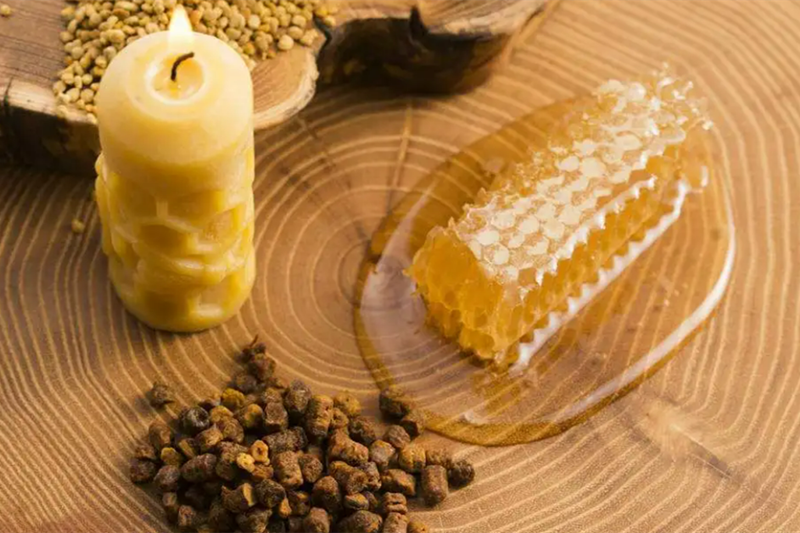Propolis is a resinous compound produced by worker bees that contains over 300 active compounds(varies depending on geographical location and plant source) including polyphenols, vitamins, and minerals, which have strong biological and pharmacological activity. Propolis products have been used by humans since more than 2,300 years ago to prevent infection of external wounds and enhance immune health. Research shows propolis extract has amazing skin-enhancing properties when applied topically. In recent years, propolis has been continuously developed and utilized, especially in the fields of skincare and health, where the pursuit of natural is on the rise. Let’s explore why propolis deserves a place in your skincare routine.
Benefits of Propolis for Skin
Antioxidant Properties
The antioxidant activity of propolis has long been widely discussed. Propolis total flavone (TFP) has a high scavenging ability on 1, 1-diphenyl-2-trinitrophenylhydrazine (DPPH), hydroxyl group, superoxide anion and other free radicals, and shows good antioxidant activity in vitro. Propolis flavonoids and phenolic acids scavenge these harmful free radicals before they can damage skin cells. Flavonoids can directly capture and remove oxygen free radicals, and the substituted phenolic hydroxyl group on the benzene ring of phenolic acids can combine with ROS to exert antioxidant function. Free radicals from sun exposure, pollution, and other sources can accelerate skin aging, but the potent antioxidant profile of propolis extract provides impressive protective effects for youthful-looking skin.
Skin Heals and Protection
The anti-inflammatory and antimicrobial properties of propolis make it extremely healing and repair for stressed and irritated skin. The propolis flavonoids fight acne-causing bacteria and reduce inflammation associated with breakouts. Propolis even accelerates wound closure by stimulating the production of growth factors and fibroblasts.
The flavonoids, amino acids, VC and some minerals in propolis can accelerate enzymatic reaction, cell metabolism, blood circulation and the formation of collagen fibers, and promote tissue repair. All of these mechanisms make propolis a powerful aid for skin healing, which is conducive to the rapid recovery of sensitive skin, nourishing damaged skin, scarred skin, and acne skin.
Anti-aging
Propolis extract contributes to the metabolic function of the skin and promotes skin regeneration. Collagen provides the foundation for firm, smooth skin. Studies show that certain flavonoids in propolis, like galangin and pinocembrin, inhibit the activity of matrix metalloproteinases (MMPs). These enzymes can break down collagen. Propolis extract allows collagen synthesis to outpace its destruction for tightened and supple skin by preventing collagen degradation. Boisard et al. found that propolis contains high levels of coniferin derivatives, and compared with natural advanced glycosylation inhibitors (such as quercetin or chlorogenic acid), propolis extract can more effectively reduce the formation of advanced glycosylation products and has a strong anti-aging effect. Proteins in pollen also help repair skin tissue, making skin smooth and elastic.
In addition, propolis extract has the function of repairing skin immunity and can form an antimicrobial protective film in the epidermis to effectively resist the invasion of foreign microorganisms, reducing the sensitivity of the skin to the outside world, so as to achieve the effect of repairing the skin barrier. Karapetsas et al. reported that Greek propolis can prevent skin oxidation and photodamage caused by ultraviolet rays (UVB), and is an effective material for the development of natural anti-aging substances.
At the same time, a large number of studies have proved that propolis can stimulate immune function, can enhance antibody production and phagocyte vitality, is a natural and efficient immune booster, which is also beneficial to skin protection.
How to Use Propolis for Better Skin
You can choose creams, serums, masks, oral supplements, capsules and tinctures that contain propolis extract to hydrate, minimize wrinkles, clear acne, and improve skin texture. Use propolis extracts diluted in water as a soothing skin toner, or combine propolis with vitamin C to boost collagen synthesis and brightness. For the best results, look for skincare products that contain at least 3% propolis extract. Some propolis products contain alcohol, it is recommended to choose non-alcohol propolis beauty care products to avoid allergic reactions.
Propolis, nature’s gift to your skin, is paving the way for a holistic approach to skincare. With its ancient allure and modern appeal, propolis, the golden treasure of beehives, is becoming a favored component in our quest for radiant skin.
- Dandelion Extract: What It Is, Benefits, Uses and Side Effect - April 23, 2024
- Is Berberine Extract Help For Weight Loss? - April 11, 2024
- Why Is Pysllium Husk Powder A Popular Meal Replacement Ingredient? - April 3, 2024



